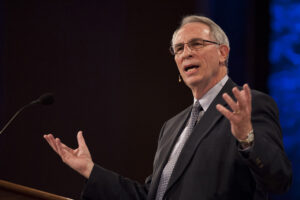
WASHINGTON (BP)–The U.S. Supreme Court’s opinion permitting local governments to seize private property for economic development will complicate matters for churches but not crush their rights, a religious liberty lawyer predicted.
In a 5-4 decision June 23, the justices ruled a city’s use of eminent domain to transfer property from one private party to another may qualify as a “public use” protected by the Constitution. More conservative members of the high court criticized the ruling as an abandonment of a “long-held, basic limitation on government power.”
The court’s decision in Kelo v. New London raised a question for churches and other religious institutions: Will they be in danger of having their property, which is typically tax-exempt, seized for development that will produce revenue for municipalities?
The Becket Fund for Religious Liberty, which is based in Washington, warned the justices in a friend-of-the-court in the case of the potential burdens on religious groups. A Becket spokesman told Baptist Press June 24, however, the high court’s decision should not result in the seizure of church property despite the problems it will cause.
“The decision yesterday did not have a damaging impact on religious institutions,” Jared Leland, the Becket Fund’s media and legal counsel, said June 24. “It did remove, however, an extra layer of protection that religious institutions would have had.
“[F]ortunately, churches have the First Amendment and [the Religious Land Use and Institutionalized Persons Act] to protect them.
“The only problem is, we’re going to have a lot more of those cases,” Leland said. “We’re still going to win the cases, but it’s going to be a tremendous headache.”
The decision “is not going to be crippling, but it certainly is unfortunate,” he said. “It shows that the pendulum is swinging in the wrong direction.”
The Institute for Justice, a Washington-based organization that sometimes deals with religious rights cases, also cited churches as potential targets for local governments in the wake of the high court’s ruling.
The opinion “undermines the rights of every American, except the most politically connected,” IJ senior attorney Dana Berliner said in a written statement. “Every home, small business or church would produce more taxes as a shopping center or office building. And according to the court, that’s a good enough reason for eminent domain.”
The Becket Fund has assisted churches that faced eminent domain proceedings by local governments. In May, Camden County in New Jersey agreed not to seize the property of Living Faith Ministries, a 6,000-member congregation, after seeking to transfer its ownership for the development of housing units. In 2003, Cottonwood Christian Center, which had more than 4,000 members at the time, agreed to sell 18 acres to Cypress, Calif., in exchange for the purchase of 29 nearby acres. The agreement came after Cypress sought to use eminent domain to take the church’s land and sell it to Costco, a discount store chain.
In both cases, the Becket Fund argued the municipalities’ efforts violated the First Amendment’s protection of free exercise of religion and the Religious Land Use and Institutionalized Persons Act, a 2000 law that bars government policies that substantially burden free exercise of religion by a person or institution. The government, however, can gain an exemption from the law if it can show it has a “compelling interest” and is using the “least restrictive means” to further that interest.
The invocation of eminent domain is based on the Constitution’s Fifth Amendment, which says private property shall not “be taken for public use, without just compensation.”
Writing for the majority, Associate Justice John Paul Stevens said the court’s ruling in Kelo fits its expansive definition of “public use” in previous cases. A plan by the city of New London, Ct., to acquire property to revitalize its downtown section, create jobs and increase revenue “unquestionably serves a public purpose,” Stevens wrote.
“Promoting economic development is a traditional and long accepted function of government,” Stevens said. “Clearly, there is no basis for exempting economic development from our traditionally broad understanding of public purpose.
“Quite simply, the government’s pursuit of a public purpose will often benefit individual private parties.”
Associate Justice Sandra Day O’Connor said in her dissent that the majority’s ruling means “all private property is now vulnerable to being taken and transferred to another private owner.”
The majority’s reasoning functions “to wash out any distinction between private and public use of property –- and thereby effectively to delete the words ‘for public use’ from the Takings Clause of the Fifth Amendment,” O’Connor wrote.
The “fallout from this decision will not be random,” she said. “The beneficiaries are likely to be those citizens with disproportionate influence and power in the political process, including large corporations and development firms. As for the victims, the government now has license to transfer property from those with fewer resources to those with more. The Founders cannot have intended this perverse result.”
Chief Justice William Rehnquist, as well as Associate Justices Antonin Scalia and Clarence Thomas, signed on to O’Connor’s dissent.
Associate Justices Anthony Kennedy, David Souter, Ruth Bader Ginsburg and Stephen Breyer joined Stevens in the majority.
Susette Kelo led nine owners in New London who refused to sell their houses and sued the city when it sought to take possession of their property. A lower court ruled partly in their favor, but the Connecticut Supreme Court decided seizure of the property was legal.
–30–















